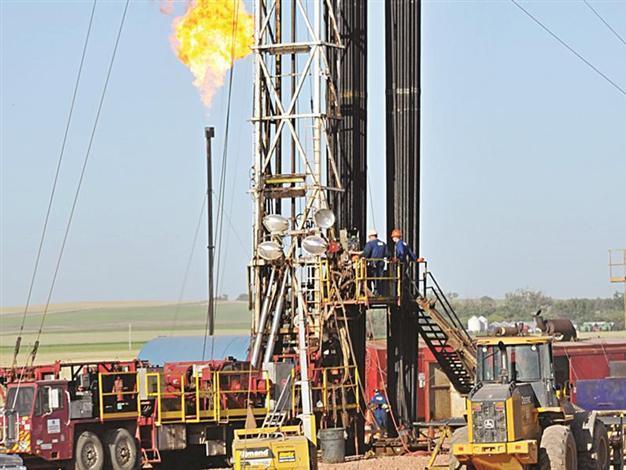US to export energy by ’17
WASHINGTON - Reuters

This file picture shows natural gas burned off next to an oil well being drilled at a site near Tioga, North Dakota. President Obama says the US is going to be a net exporter of energy in the coming years because of new technologies. AFP photo/ Karen BLEIER
The sudden boom in U.S. oil and natural gas production could eventually lead to a shift in relations with the Middle East as the United States becomes a net exporter of energy, President Barack Obama has said.
The United States is on track to surpass Saudi Arabia as the world’s top oil producer by 2017. As early as 2016, the government has said the U.S. could be a net exporter of natural gas, and the Obama administration is weighing whether to allow exports to a broader range of destinations.
“The United States is going to be a net exporter of energy because of new technologies and what we’re doing with natural gas and oil,” Obama said in an interview with TIME magazine that was published Dec. 19, noting that foreign oil imports have dropped, a trend he said he expects to continue.
“And that, I think, gives us more freedom of movement to speak to the kind of Middle East that we want to see and the world we want to see,” Obama told TIME, which named him as its Person of the Year.
Increasing U.S. domestic energy production was a key issue of the presidential campaign of 2012 that Obama won, as both he and Republican challenger Mitt Romney stressed the need to ramp up production and reduce dependence on oil produced in unstable Middle Eastern countries.
Energy and climate prioritiesThe Obama administration has moved cautiously in its response to a wave of Arab Spring uprisings that have ousted some long-serving rulers and led to a rise of Islamist political movements in places like Egypt and Tunisia.
Obama was asked by TIME to describe some of his foreign policy priorities for his second term, and spoke in general terms about his hopes that the Middle East and North Africa eventually will become “freer, more open, and more economically successful.”
Obama listed energy and addressing the impacts of climate change as two of his top domestic priorities. “My primary focus is going to continue to be on the economy, on immigration, on climate change and energy,” he said.
One of the most contentious energy decisions Obama will face early in his second term is whether to allow exports of natural gas beyond countries with which the United States has free trade deals. The Energy Department is studying the impact that expanded shipments would have on domestic energy prices.
In the TIME interview, Obama also singled out tax breaks received by the oil and gas industry for criticism. His administration has pushed for more development of wind, solar and other less-polluting types of energy.
Some lawmakers have said the tax incentives will be examined during what is expected to be a comprehensive effort to reform the U.S. tax code next year. “I’ve been arguing that it doesn’t make sense for us to spend $4 billion subsidizing an oil industry that’s mature and very profitable,” Obama said. “We should be using that money to finance clean energy of the future.”
